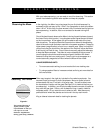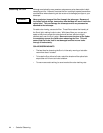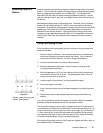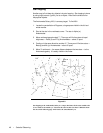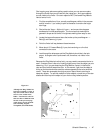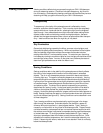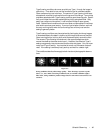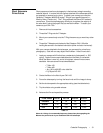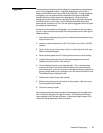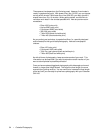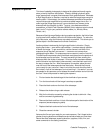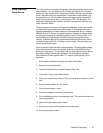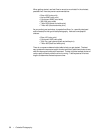
Celestial Photography • 51
Short exposure prime focus photography is the best way to begin recording
celestial objects. It is done with the camera attached to the telescope without
an eyepiece or camera lens in place. To attach your camera you need the
Celestron T-Adapter (#93633-A) and a T-Ring for your specific camera (i.e.,
Minolta, Nikon, Pentax, etc.). The T-Ring replaces the 35mm SLR camera’s
normal lens. Prime focus photography allows you to capture the majority of
the solar disk (if using the proper filter) as well as the Moon. To attach your
camera to your CM-1100:
1. Remove all visual accessories.
2. Thread the T-Ring onto the T-Adapter.
3. Mount your camera body onto the T-Ring the same as you would any other
lens.
4. Thread the T-Adapter onto the back of the Celestron CM-1100 while
holding the camera in the desired orientation (either vertical or horizontal).
With your camera attached to the telescope, you are ready for prime focus
photography. Start with an easy object like the Moon. Here’s how to do it:
1. Load your camera with film that has a moderate-to-fast speed (i.e., ISO
rating). Faster films are more desirable when the Moon is a crescent.
When the Moon is near full, and at its brightest, slower films are more
desirable. Here are some film recommendations:
• T-Max 100
• T-Max 400
• Any 100 to 400 ISO color slide film
• Fuji Super HG 400
2. Center the Moon in the field of your CM-1100
3. Focus the telescope by turning the focus knob until the image is sharp.
4. Set the shutter speed to the appropriate setting (see the table below).
5. Trip the shutter using a cable release.
6. Advance the film and repeat the process.
Short Exposure
Prime Focus
Lunar Phase ISO 50 ISO 100 ISO 200 ISO 400
Crescent 1/2 1/4 1/8 1/15
Quarter 1/15 1/30 1/60 1/125
Full 1/30 1/60 1/125 1/125
Table 7-1
Above is a listing of recommended exposure times when photographing the
Moon at the prime focus of your Celestron CM-1100 telescope.



